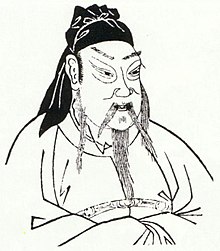
Back كوان يو Arabic كوان يو ARZ ཀོན་ཡུས། Tibetan Guan Yu Catalan Guăng Ṳ̄ CDO Kuan Jü Czech Guan Yu Danish Guan Yu German Guan Yu Spanish Guan Yu Basque
Guan Yu | |
|---|---|
| 關羽 | |
 A portrait of Guan Yu in the Sancai Tuhui | |
| General of the Vanguard (前將軍) | |
| In office 219–220 | |
| Monarchs | Liu Bei (King of Hanzhong) / Emperor Xian (Han dynasty) |
| General Who Defeats Bandits (盪寇將軍) (under Liu Bei) | |
| In office c. 211–219 | |
| Monarch | Emperor Xian of Han |
| Administrator of Xiangyang (襄陽太守) (under Liu Bei) | |
| In office c. 211–219 | |
| Monarch | Emperor Xian of Han |
| Lieutenant-General (偏將軍) (under Cao Cao, then Liu Bei) | |
| In office 200 – c. 211 | |
| Monarch | Emperor Xian of Han |
| Personal details | |
| Born | Unknown Xie County, Hedong Commandery, Han Empire (present-day Yuncheng, Shanxi) |
| Died | January or February 220[a] Linju County, Xiangyang Commandery, Han Empire (present-day Nanzhang County, Hubei) |
| Children | |
| Occupation | General |
| Courtesy name | Yúncháng (雲長) |
| Posthumous name | Marquis Zhuàngmóu (壯繆侯) |
| Peerage | Marquis of Hànshòu Village (漢壽亭侯) |
| Deity names |
|
| Other names |
|
| Guan Yu | |||||||||||||||||||||||||||||||||||
|---|---|---|---|---|---|---|---|---|---|---|---|---|---|---|---|---|---|---|---|---|---|---|---|---|---|---|---|---|---|---|---|---|---|---|---|
 Guan's name in Traditional (top) and Simplified (bottom) Chinese characters | |||||||||||||||||||||||||||||||||||
| Traditional Chinese | 關羽 | ||||||||||||||||||||||||||||||||||
| Simplified Chinese | 关羽 | ||||||||||||||||||||||||||||||||||
| Hanyu Pinyin | |||||||||||||||||||||||||||||||||||
| |||||||||||||||||||||||||||||||||||
Guan Yu ([kwán ỳ] ; d. January or February 220[a]), courtesy name Yunchang, was a Chinese military general serving under the warlord Liu Bei during the late Eastern Han dynasty of China. Along with Zhang Fei, he shared a brotherly relationship with Liu Bei and accompanied him on most of his early exploits. Guan Yu played a significant role in the events leading up to the end of the Han dynasty and the establishment of Liu Bei's state of Shu Han during the Three Kingdoms period. While he is remembered for his loyalty towards Liu Bei, he is also known for repaying Cao Cao's kindness by slaying Yan Liang, a general under Cao Cao's rival Yuan Shao, at the Battle of Boma. After Liu Bei gained control of Yi Province in 214, Guan Yu remained in Jing Province to govern and defend the area for about seven years. In 219, while he was away fighting Cao Cao's forces at the Battle of Fancheng, Liu Bei's ally Sun Quan broke the Sun–Liu alliance and sent his general Lü Meng to conquer Liu Bei's territories in Jing Province. By the time Guan Yu found out about the loss of Jing Province after his defeat at Fancheng, it was too late. He was subsequently captured in an ambush by Sun Quan's forces and executed.[2]
Guan Yu's life was lionised and his achievements were glorified to such an extent after his death that he was deified during the Sui dynasty. Through generations of storytelling, culminating in the 14th-century historical novel Romance of the Three Kingdoms, his deeds and moral qualities have been given immense emphasis, making Guan Yu one of East Asia's most popular paradigms of loyalty and righteousness. He is remembered as a culture hero in Chinese culture and is still worshipped by many people of Chinese descent in China, Taiwan, and other countries today. In religious devotion, he is reverentially called the "Emperor Guan" (Guān Dì) or "Lord Guan" (Guān Gōng). He is a deity worshipped in Chinese folk religion, popular Confucianism, Taoism, and Chinese Buddhism, and small shrines to him are almost ubiquitous in traditional Chinese shops and restaurants.
- ^ ([建安二十四年]十二月,璋司馬馬忠獲羽及其子平於章鄉,斬之,遂定荊州。) Zizhi Tongjian vol. 68.
- ^ Perkins (1999), p. 192.
Cite error: There are <ref group=lower-alpha> tags or {{efn}} templates on this page, but the references will not show without a {{reflist|group=lower-alpha}} template or {{notelist}} template (see the help page).
© MMXXIII Rich X Search. We shall prevail. All rights reserved. Rich X Search